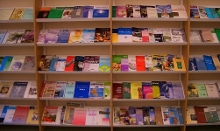 |
**__Related stories:__***linkurl:Citation Violations;http://www.the-scientist.com/article/display/55627/
[May 2009]*linkurl:Critics rip Cell paper;http://www.the-scientist.com/blog/display/55240/
[25th November 2008]*linkurl:Demand Citation Vigilance;http://www.the-scientist.com/article/display/12829/
[21st January 2002]*linkurl:The Ethics Of Citation: A Matter Of Science's Family Values;http://www.the-scientist.com/article/display/17598/
[9th June 1997]













